|
JEAN PICHORE - LADY FORTUNE AND HER WHEEL
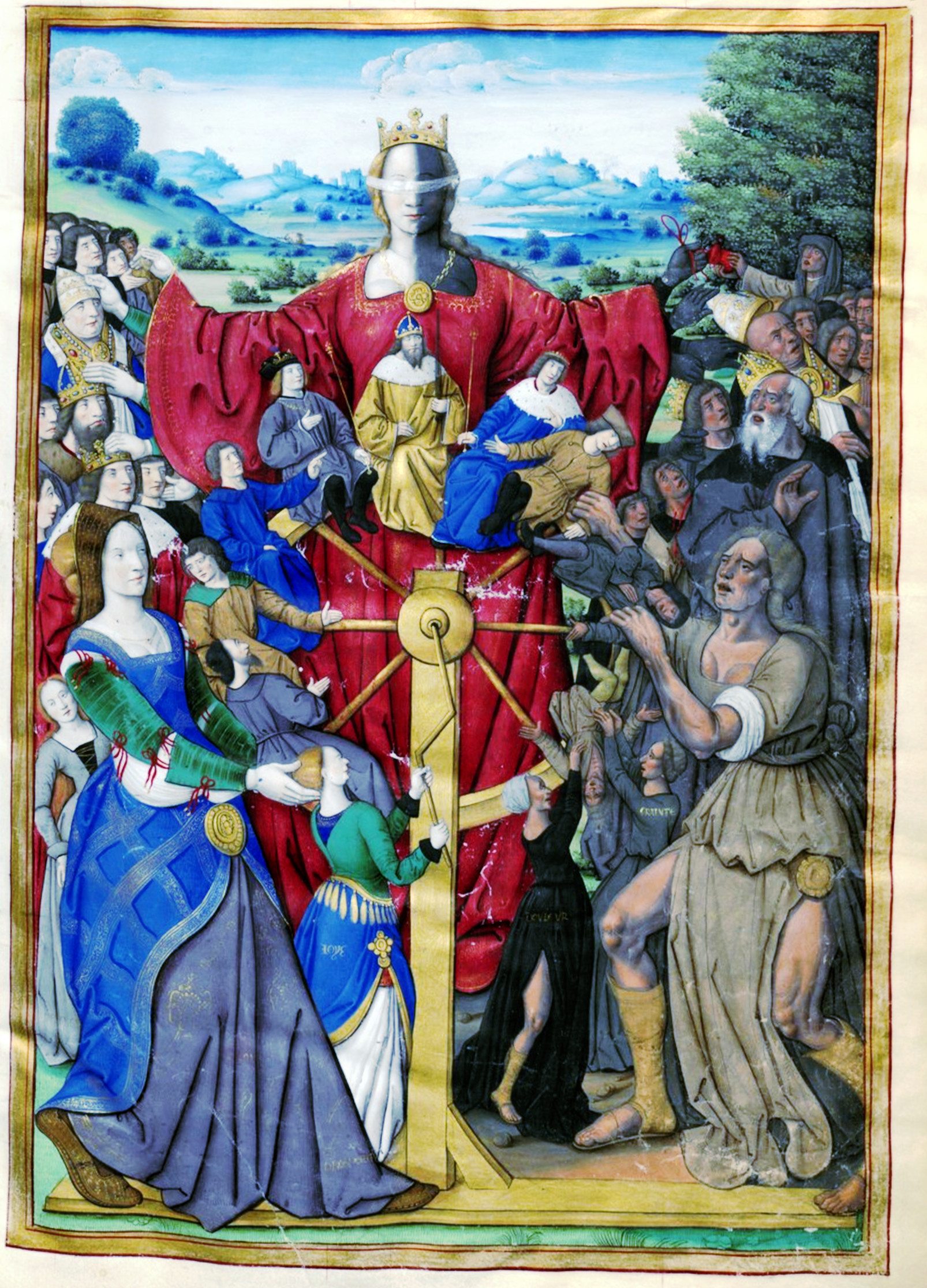
Jean Pichore, Public domain, via Wikimedia Commons
1503-1505 |
- Lady Fortune and her Wheel, from
Petrarch's Les Remèdes de l'une et l'autre fortune.
-
Tempera and gold on parchment.
- Bibliothèque Nationale de France.
- Depicts Lady Fortune with her symbolic wheel, representing the concept of fate.
- In Greek mythology she was called Tyche and in Roman
mythology she was Fortuna.
- The illumination reflects the 16th-century fascination
with this subject.
Fortuna (Latin: Fortūna, equivalent to the Greek goddess Tyche), historically anglicized as Fortune, is the goddess of fortune and the personification of luck in Roman religion who, largely thanks to the Late Antique author Boethius, remained popular through the Middle Ages until at least the Renaissance.
(Wikipedia) |
|
Wheel of Fortune
Concept |
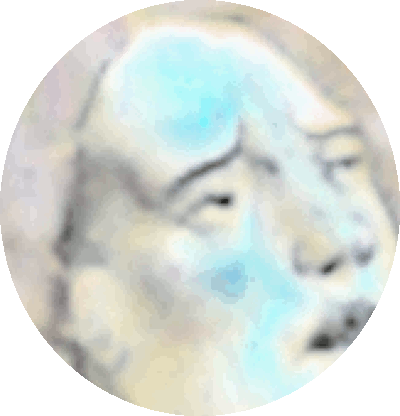
Boethius |
- Anicius Manlius Severinus Boethius
(480-525) was a Roman statesman and philosopher of the Early Middle Ages.
- He was born into an aristocratic Roman family in 480 AD, he received an excellent education, and by age
30 was rising quickly through the ranks of Rome's imperial administration.
- In his spare time, he translated Aristotle and Plato from Greek into Latin, and wrote books on music, mathematics and medicine that became standard textbooks.
- Boethius' works are considered the foundation of medieval Christian ethics and logic.
This Wheel of Fortune concept comes from The Consolation of Philosophy, written in 543 CE by Boethius. Artists reproduced this popular image in thousands of manuscripts as well as the earliest tarot decks.
(tarot-heritage.com) |
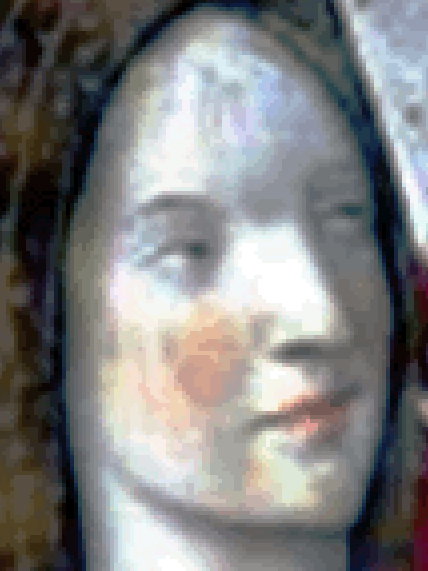
Sophia |
- Boethius had been a successful public figure in the court of King Theodoric until he was implicated in a conspiracy against the king.
- In the year 523, at age 43, he had gone as high as one can go in the imperial administration, becoming Master of Offices in the court of Theodoric, the Ostrogoth king who conquered Italy and ruled from Ravenna.
-
He was the golden boy of the late Roman empire who lost everything in a dramatic turn of the wheel.
- His dramatic fall from grace is analogous to the wheel of fortune and forms the content of his
brush with the goddess Sophia who is wisdom.
Inconstancy is my very essence; it is the game I never cease to play as I turn my wheel in it’s ever changing circle, filled with joy as I bring the top to the bottom and the bottom to the top.
(Boethius, The Consolations of Philosophy) |
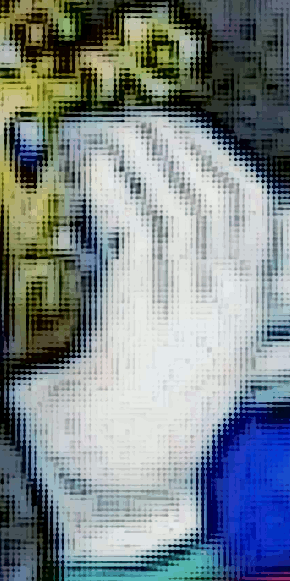
Withdrawn |
- For a long while Boethius had enjoyed Fortuna's favor, but she had now withdrawn her hand and with it
his good fortune and happiness.
- He now found himself at the bottom of the Wheel of Fortune.
- Fortuna was harsh and showed Boethius that real happiness
does not lie in things that can be taken away by her changing whims.
- Things like wealth, power, fame and possessions can all be taken away,
because they are external and dependent on circumstances beyond
our control.
- They are the domain of Fortune and her wheel.
- Real happiness, on the other hand, lies in something that can never be taken away by fickle Fortune.
Yes, rise up on my wheel if you like, but don’t count it an injury when by the same token you begin to fall, as the rules of the game will require.
(Boethius, The Consolations of Philosophy) |
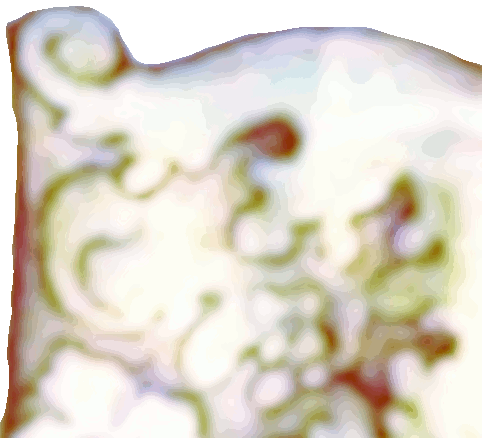
|
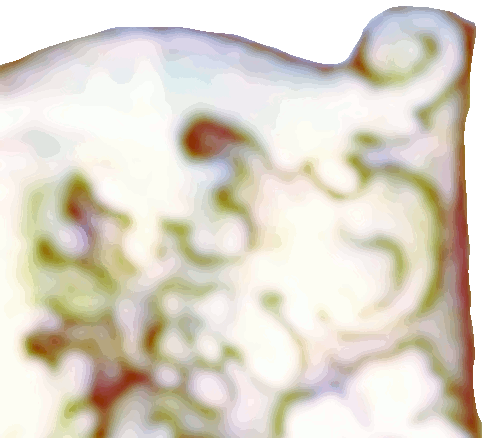
|
|
Translations |
- Boethius is remembered for his unjust imprisonment and execution under the Ostrogoth king Theodoric the Great.
- Accused of treason which is largely viewed as politically and religiously motivated due to Boethius's loyalty to the Roman Senate and his Catholic faith.
- He was imprisoned at Pavia, tortured, and ultimately executed in 524.
During his imprisonment, Boethius composed "The Consolation of Philosophy," which has been influential in shaping medieval and early modern thought. This work, presented as a dialogue with the allegorical figure Lady Philosophy, explores themes of happiness, fortune, evil, and divine knowledge, reflecting both Platonic and Christian values.
(ebsco.com) |
|
Greek and
Roman Mythology |
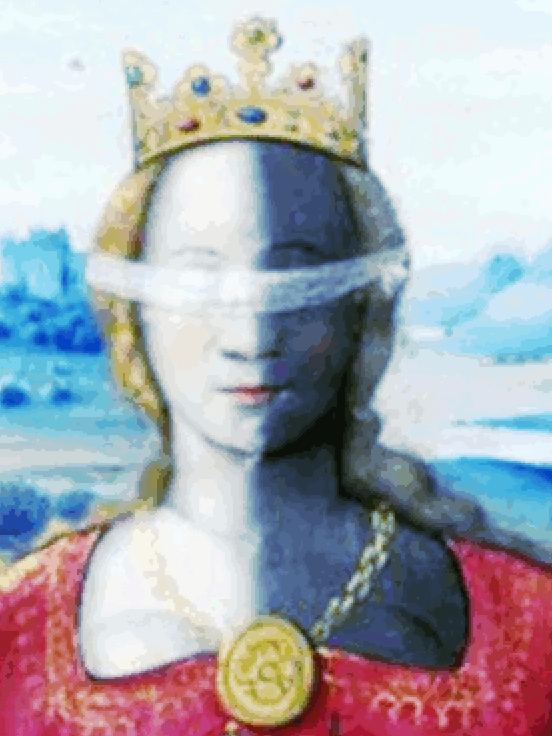
Lady Fortune |
- Fortune, a beautiful woman, spins her wheel, which represents the changes she brings about in
our lives.
-
The Rota Fortunae or Wheel of Fortune is an ancient and medieval idea represented by a spinning wheel which Fortune turns, symbolizing the changing nature of fate.
- She’s often blindfolded because she dispenses good and bad fortune indiscriminately, regardless of whether the recipient is deserving or not.
When Fortune means to men most good, She looks upon them with a threatening eye.
(Shakespeare, King John) |

Midsummer's night
dream |
- All people were subject to
Fortuna; king and peasant, merchant and beggar alike.
- June 24th, is the ancient Roman festival of Fortuna, the goddess of luck and worldly fortunes
and is also called the 'Day of Miracles' in astrology.
Why then do you mortal men seek after happiness outside yourselves, when it lies within you? You are led astray by error and ignorance…
So if you are in possession of yourself you will possess something you would never wish to lose and something Fortune could never take away.
(Boethius, The Consolations of Philosophy) |
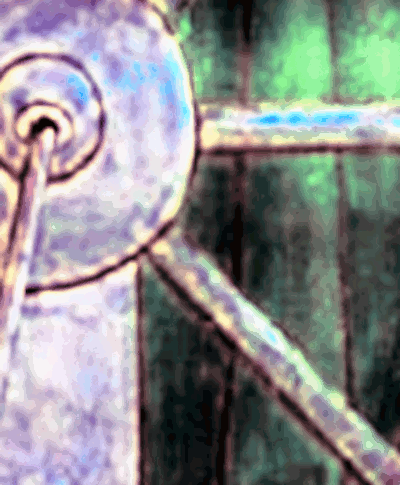
Wooden ship
wheel |
- The Roman goddess Fortuna, the
goddess of fate, was depicted holding a ships rudder in one hand, a gubernaculum, with which she steered fate, a ball or wheel of fortune and a cornucopia, horn of plenty, in the other, from which she distributed her gifts to those fortunate to receive them.
- She was associated with luck, wealth, and fertility and
is often shown with a wheel and orb.
- Fortuna might bring good or bad luck
and could be represented as veiled and blind, as in modern depictions of Lady Justice, except that Fortuna does not hold a balance.
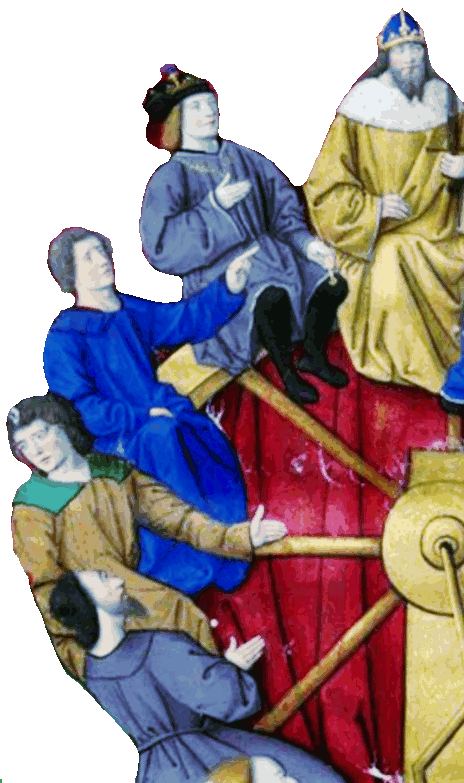
O Fortuna |
- A king sits on top of the wheel, but a simple turn of the wheel can bring him down in station while it raises the fortunes of another.
- Philosophy demonstrates that Fortune rules the world and that the wise person ignores her ever-shifting ways, preferring eternal truths.
Slings and arrows of outrageous fortune.
(Shakespeare, Hamlet) |
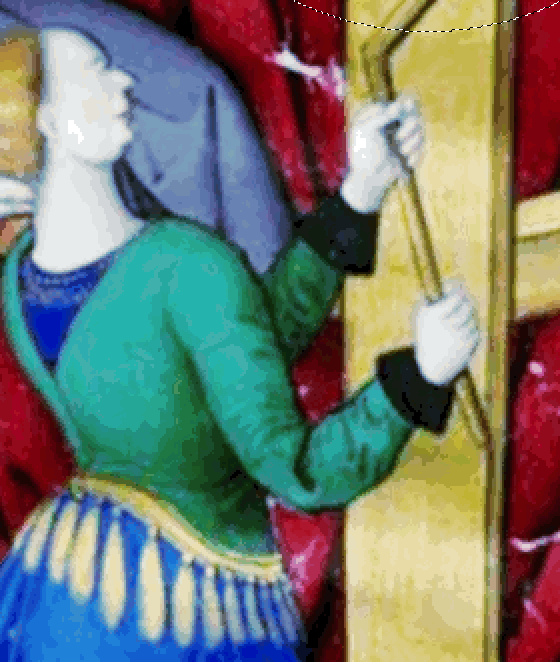
Her nature is change |
- In medieval and ancient philosophy, the Wheel of Fortune or Rota Fortunae is a symbol of the capricious nature of
fate.
- Fortuna spins it at random, changing the positions of those on the wheel: some suffer great misfortune, others gain windfalls.
The metaphor was already a cliché in ancient times, complained about by Tacitus, but was greatly popularized for the Middle Ages by its extended treatment in the Consolation of Philosophy by Boethius from around 520.
(Wikipedia) |
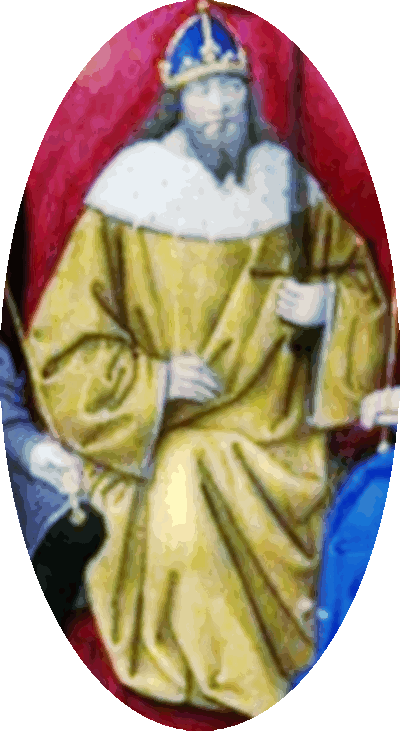
Top of the wheel |
- Fortuna turns a large wheel of the sort used in watermills, to which kings and other powerful figures are attached.
- In medieval depictions of the wheel, four persons (often kings) are placed on the outer rim, who rise up and down with the turning of the wheel.
- This was a common image in manuscripts and books from the
medieval
period.
Fortune, good night, smile once more; turn thy wheel!
(Shakespeare, King Lear) |
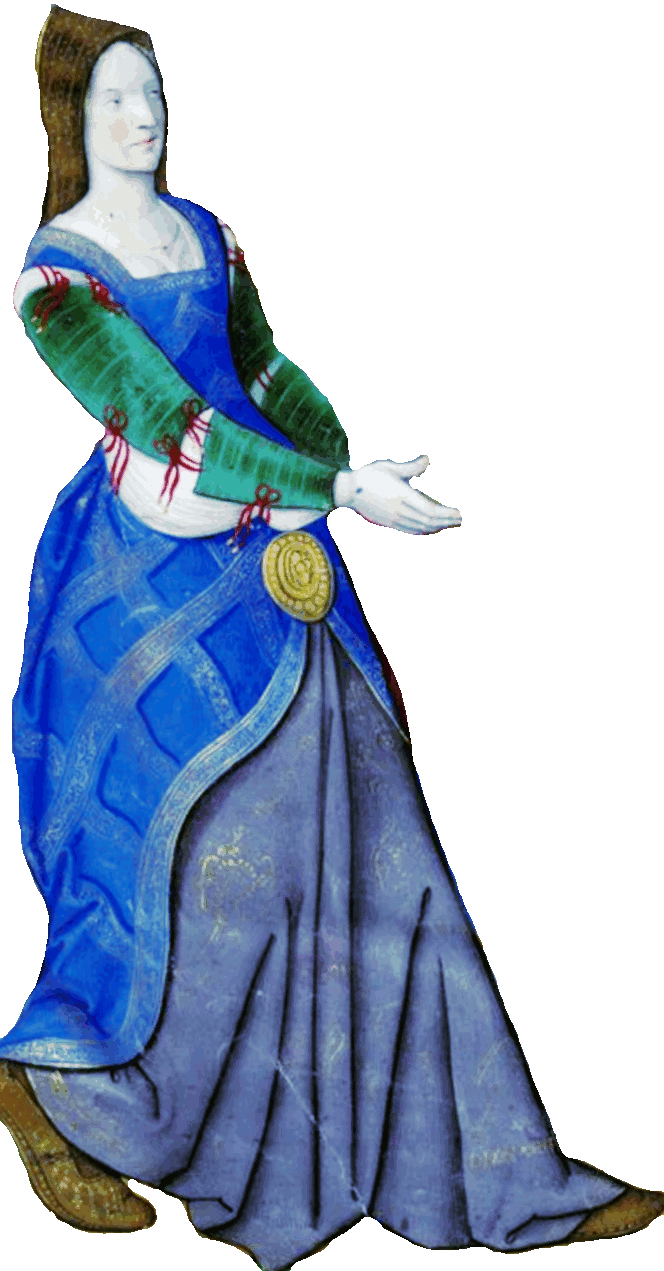
Lady Fortune is
Tyche |
- Tyche, who is the Greek version of
Fortuna, is balanced precariously on a ball in the middle of the ocean, embodying changeable luck.
- Hesiod wrote about the Greek goddess of fortune, Tyche.
- Depictions often show her blindfolded or balancing on a ball to convey the uncertainty and change of fortune.
- Her role in Rome was much greater than Tyche to the Greeks.
- It was Fortuna who became most popular in the Medieval period
because of Boethius.
I am Fortune’s fool.
(Shakespeare, Romeo and Juliet) |
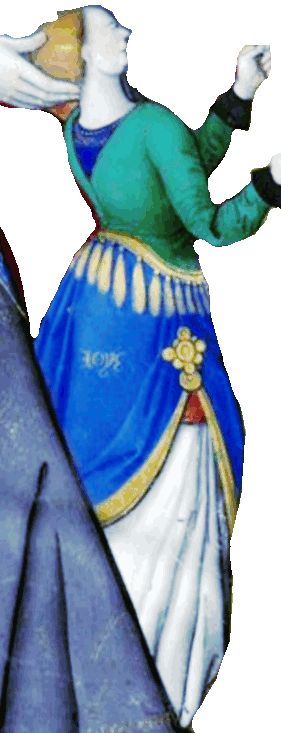
Automatia |
- Automatia
is the surname of Tyche or Fortuna, the goddess who manages things according to her own will, without any regard to the merit of man.
- There are many examples of automata in Greek mythology: Hephaestus created automata for his workshop; Talos was an artificial man of bronze; King Alkinous of the Phaiakians employed gold and silver watchdogs.
- According to Aristotle, Daedalus used quicksilver to make his wooden statue of Aphrodite move.
- The Greek inventor Ktesibios
understood the priniciples of pneumatics and created a large number of water-powered Automata.
The famous Greek Mathematician, Hero of Alexandria, devised a water basin that featured metal birds which sang. An mechanical owl would turn its head to look at the birds, making them go quiet. One of his most well-known creations was a windwheel- this is possibly the earliest example of man harnessing the power of wind in a non-sea environment.
(themadmuseum.co.uk) |
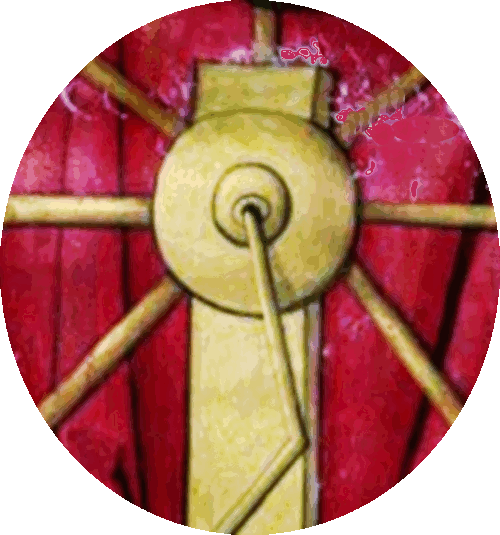
Wheel of Fortune |
- From the Middle Ages onwards, the Wheel of Fortune made its appearance in literature, from Dante to Shakespeare and Sir Thomas More.
- In Dante’s Inferno, Fortuna lives in the Underworld with Plutus the god of gold, helping to distribute the god’s wealth to people above ground.
- Geoffrey Chaucer uses the Wheel of Fortune to describe the tragic fall of several historical figures in his
Monk’s Tale.
- Roman scholar Cicero and the Greek poet Pindar both reference the Wheel of Fortune.
- Fortune's wheel can also be found in Thomas More's Utopia.
Break all the spokes and fellies from her wheel.
(Shakespeare, Henry V) |
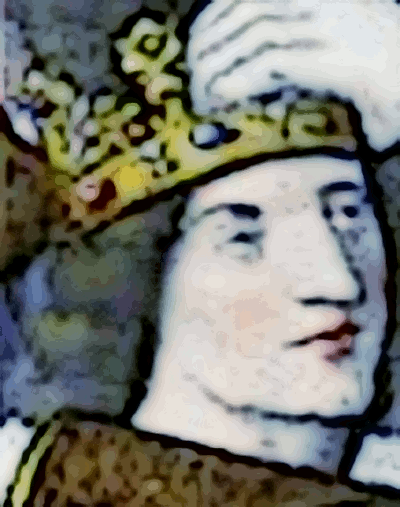
King Lear |
- In Elizabethan times, this idea was a popular theme in literature, prominently featured in plays like Shakespeare's
Hamlet and King Lear, exploring the tension between human agency and destiny and the fleeting nature of success and misfortune.
- People strongly believed in superstition, fate, destiny and the wheel of fortune.
During the Elizabethan era, one’s destiny or fate was viewed by most as predetermined.
"Most of the people in Shakespeare’s time believed in astrology, the philosophy that a person’s life was partly determined by the stars and the planets."
(owlcation.com) |
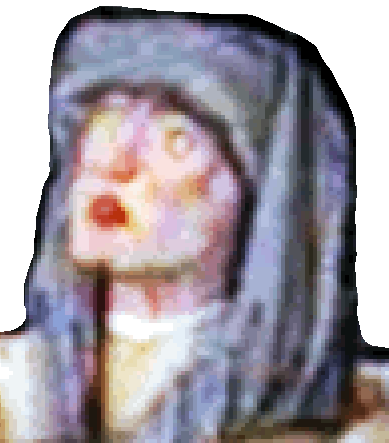
Lady Fate |
- Queen Elizabeth I was the queen of England during the late 16th century
and she wrote a poem called In Defiance of Fortune.
- Elizabeth acknowledges that Fortune has the power to control her external circumstances, but she declares that she will not be controlled by it.
For thy sweet love remembered such wealth brings, That then I scorn to change my state with kings.
(Elizabeth I) |
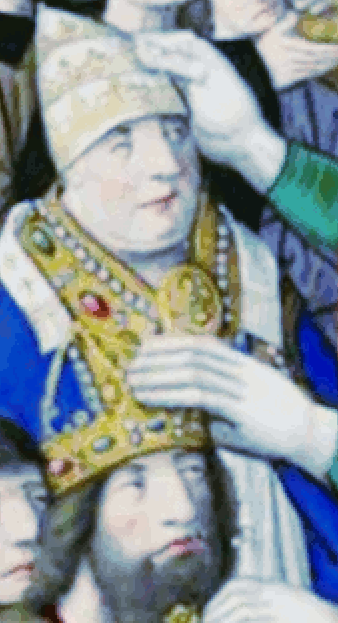
Fate changes |
- Throughout Shakespeare's works, Fortuna is a powerful force that can make even kings go from greatness to ruin with her wheel.
-
Shakespeare mentions fortune over 500 times in his plays and frequently in his tragedies.
And of buxom valor, hath by cruel fate
And giddy Fortune's furious fickle wheel
That goddess blind,
That stands upon the rolling restless stone.
(Shakespeare, Henry V) |
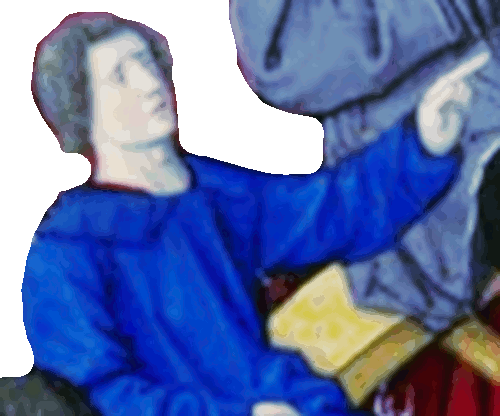
Outrageous Fortune |
- Fortuna has become a popular scapegoat for misfortune in tragedy.
- She is often used as a scapegoat to blame when someone experiences a disaster.
- At the same time, all tragedy raises questions about the nature of free will; how much of bad fortune is the result of fate, and how much is a direct result of the character’s bad choices?
Men at some time are masters of their fates.
The fault, dear Brutus, is not in our stars
But in ourselves, that we are underlings.
(Shakespeare, Julius Caesar) |
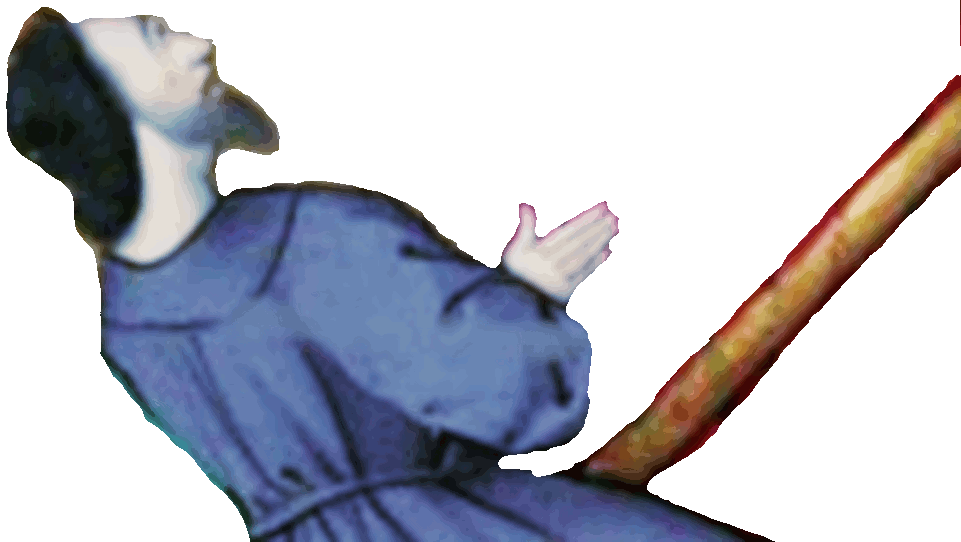
Threads of life |
- The Greeks took more comfort from
thinking that goddesses with a guiding hand controlled their fate
rather than a wheel.
- In
response, the Moirai, and their Roman counterparts the Parcae, known as
'The Three Fates' were destiny incarnate.
- The Greek poet Hesiod wrote about the fates in his
Theogony in the 8th-century.
- These three sisters control a person’s life from birth to death.
- Clotho, as in cloth, is the one spinning the threads of life
and she spins and spins until Lachesis, the 'Apportioner of Lots' measures it with her rod.
- Finally, Atropos chose the manner of death and ended the life of mortals by cutting their threads.
And the Fates [Night] bore, and merciless punishing Furies who prosecute the transgressions of men and gods—never do the goddesses cease from their terrible wrath until they have paid the sinner his due.
(Hesiod, Theogony, Works and Days) |
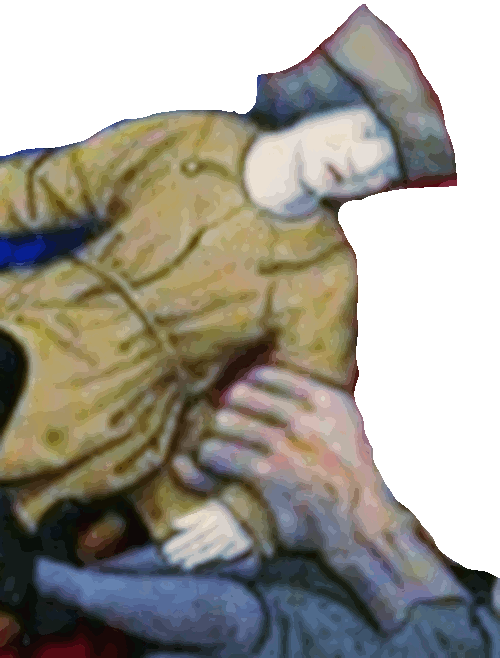
Tarot Fool |
- In tarot, The Wheel of Fortune is a halfway point on our journey through the Major Arcana.
- It's the position where we have done a bit of living but there is more to come
and therefore, the wheel is connected to The Fool and The World.
- Like The World, it is in a state of perpetual motion and
when you draw The Wheel of Fortune, undoubtedly, things are
moving.
All the while the tetramorphs, the fixed zodiac signs or the four gospels, Matthew, Mark, Luke and John, sit in each corner, they reflect the four elements and make sure that the wheel doesn't spin off into oblivion. These creatures in the corners also connect to Ezekiel's vision of a mighty chariot or Merkabah. It is symbolic of the throne chariot of God, which is in an ascending state. This suggests that the soul is in search of the ascending path.
(collegeofpsychicstudies.co.uk) |
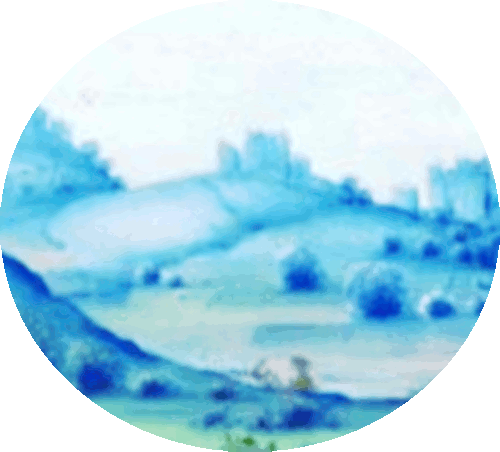
Utopia |
- Fortune and her Wheel have remained an enduring image throughout history.
-
She was associated with good or bad luck and was considered a personification of luck, and has survived in modern
ideals as ‘lady luck’ especially when ones odds appear favorable.
No mortal power may stay her spinning wheel.
The nations rise and fall by her decree.
None may foresee where she will set her heel.
(Dante's Inferno) |
|
|

